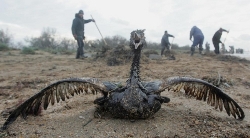
The Mumbai Oil Spill
There was some good news for the Indian shipping industry as the nation's two premier ports-Jawaharlal Nehru Port Trust and Mumbai Port Trust-reopened for business partially. Thirty-two ships had been stranded at the two ports. Most of these carry vegetable oils, steel, crude oil, and naphtha.
Navy ships were pressed into service and escorted small and medium cargo ships in and out of the canal. Vessels with a draft of less than nine meters will be allowed to use the port during high tide and under a naval escort. Authorities have stated that it will take at least another week before the bigger ships can sail through. The Indian Navy's Western Command conducted the operation with the help of a convoy made up of ships and helicopters. The convoy guided the ships by steering them clear of floating and submerged containers.
The two ports were shut down for five days after two ships, MSC Chitra and MV Khalija-III, ran into each other off the coast of Mumbai on August 7 and the containers from the former spilled into the sea, leaking oil. Over 300 containers from the MSC Chitra fell into the water. The Chitra had 1,219 containers on board, of which 31 held hazardous chemicals and pesticides.
The oil slick has spread to a distance of two nautical miles from the ship. The vessel was carrying 2,662 tons of heavy oil in its various tanks and 245 tons of diesel oil. Around 800 tons of oil is estimated to have spilled into the sea. The oil spill has hit shipping companies the hardest as ship movement to and from the ports of Mumbai and JNPT had been suspended. These two ports handle 60 percent of India's container traffic.
The total number of containers handled at each of these ports had dwindled to 10-15 percent of their regular capacity. It was estimated that the trade loss incurred could touch the $4 billion mark if the issue was not resolved by the weekend. Exporters and importers turned to the government seeking financial relief. About 33,000-35,000 export boxes are inside the three terminals at the JN Port awaiting the arrival of vessels for loading while nearly 20 vessels have been diverted to other ports.
Fuel Shortage
With the ports limping back into operation mode, fears of a fuel shortage in the city of Mumbai have been quelled. There was a possibility that the city would run out of fuel if the ports did not reopen soon. Oil and fertilizer ships will be let in on priority.
However, major oil companies such as Oil and Natural Gas Corp. (ONGC), Bharat Petroleum Corp., and Hindustan Petroleum Corp. have sought to assuage fears by maintaining that production at their plants in Mumbai are normal and there is no shortage foreseen whatsoever.
Ecological Impact
The impact is already being felt along the Mumbai coastline, with fish and other marine creatures being found covered with oil. The oil slick has entered the sensitive mangrove belt and is likely to damage the environment there. The shores along the green mangroves are coated with slick black oil. Containers of pesticide are also thought to have spilled over and this is causing alarm to environmentalists.
The government had banned fishing in the region soon after the collision occurred. The state fisheries department is carrying out random sampling at various locations throughout the city. The state government has appointed the National Environmental Engineering Research Institute and Goa-based National Institute of Oceanography to assess the environmental impact of the accident.
The Energy and Resource Institute (TERI) has volunteered to clean up the oil spill with its indigenously developed and patented formula of bacteria called as 'Oil Zapper.' The process uses bacteria to clean-up the oil slick. This might help do away with the effects of the spill.
Cause of the Accident
Preliminary investigations suggest that the accident occurred as a result of communication errors. An inquiry is being conducted by the Directorate General of Shipping and a report is expected to be tabled in a month. The captains of the two ships have blamed each other for the mishap. Captain Laxman Dubey of the Khalija-III alleged that he attempted to establish radio contact with the MSC Chitra thrice but received no response.
Captain M Ranjit Martin, who was at the helm of the Chitra, said that it was negligence on the part of Captain Dubey that led to the accident. He claimed that the Khalija-III was not in a good condition after being grounded by Mumbai port authorities earlier in July. The vessel had been moving into the port when it collided with the Chitra. The Geneva headquartered Mediterranean Shipping Company, which owns the Chitra, has stood by its captain on the issue.
Salvage Operation
SMIT Salvage is continuing with operations to clear the containers from the channel. It has cleared about 60 containers from the sea. The cleanup operation will be tedious and time consuming as it takes many hours to lift a container by employing metal ropes and a crane. A floating crane and two tugs have been employed to tow and pick up containers drifting in the channel.
SMIT is also pumping out the remaining fuel from the MSC Chitra to avoid any further spill. Attempts to straighten the ship, which is dangerously tilted, failed because of the weather conditions. The Chitra is tilted at an angle of about 75 degrees. Shipping officials estimate that clearing the ill-fated ship could take a few months.
Published on 2010/08/16 by STEVE AUSTIN
Learn from our Research
We share professional crude oil price intelligence, research and insights.
Unsubscribe at any time. 60,000+ people are now receiving our research.
